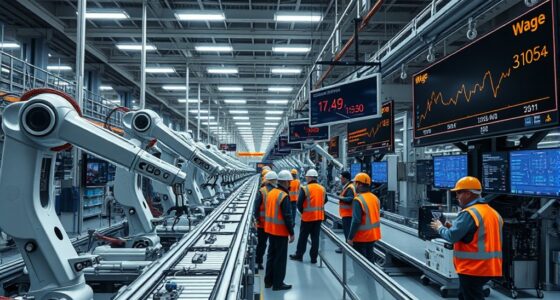Generative AI is quietly taking over many white-collar tasks that used to need human effort, like reviewing documents, analyzing data, or drafting reports. It’s automating routine jobs in legal, finance, consulting, and admin roles, often without you noticing. Companies are adopting AI gradually, mainly to cut costs and boost efficiency. If you want to understand how this shift is happening and what it means for your work, there’s more to explore ahead.
Key Takeaways
- Generative AI automates routine white-collar tasks like document review, data analysis, and report drafting in various industries.
- AI tools are quietly taking over tasks previously performed by humans, especially in legal, finance, and administrative roles.
- Companies adopt AI gradually, starting with simple tasks to streamline operations and reduce costs.
- Many entry-level roles involving customer service, scheduling, and administrative support are being replaced by AI chatbots and virtual assistants.
- The ongoing AI integration is transforming jobs, prompting workforce reskilling and adaptation to new skill requirements.

Generative AI is transforming the workplace by automating many white-collar tasks, especially in legal, finance, consulting, and administrative roles. As AI tools become more advanced, they’re quietly taking over routine tasks that once required human effort. For example, in legal and finance sectors, entry-level positions involving document review, data analysis, and report drafting are increasingly handled by AI systems. Goldman Sachs estimates that up to 300 million full-time jobs worldwide could be replaced by AI, highlighting the magnitude of this shift. Nearly 60% of jobs in advanced economies are exposed to automation, meaning a significant portion of the workforce faces disruption.
By 2025, the World Economic Forum predicts AI could replace as many as 85 million jobs globally, with early adoption serving as a testing ground for more integrated automation later in the decade. You might not realize it, but many tasks you perform—such as basic customer service, scheduling, or administrative support—are already becoming automated. About 20% of customer service roles are at risk of being replaced by AI chatbots and virtual assistants, reducing the need for human agents to handle simple inquiries. Administrative and secretarial jobs, which involve routine data entry, scheduling, and communication tasks, are highly susceptible to automation as well.
This shift has serious economic and societal implications. Unemployment could rise sharply, potentially hitting 10-20% in the coming years, prompting governments to prepare for a new employment landscape. Many workers remain unaware of the risks they face, and industry adaptation is essential for remaining competitive. Companies that embrace AI can streamline operations and cut costs, but workers who cling to traditional roles risk displacement. The social impact raises concerns about inequality, as those with adaptable skills will thrive while others may struggle to find new employment.
While AI automates basic cognitive functions, it still struggles with tasks requiring analytical thinking, emotional intelligence, and social skills. As a result, some jobs will transform rather than disappear outright, with workers needing to develop new skill sets to stay relevant. The adoption of AI is occurring gradually, starting with simpler tasks, but technological advancements are accelerating this progression. AI’s evolution means that roles in law, finance, consulting, and administration will continue to change, demanding workers to adapt quickly. Reskilling efforts will be crucial for the workforce to transition smoothly into this new landscape.
Despite fears of job loss, AI also creates new opportunities. It spurs demand for roles in AI development, data analysis, and system maintenance. As AI takes over repetitive tasks, workers can focus on strategic, creative, and interpersonal functions, but only if they acquire the necessary skills. Interestingly, AI’s integration into workplaces has been accelerated by recent technological breakthroughs, which further underscores the urgency for workforce adaptation. In the end, AI’s quiet encroachment into white-collar jobs underscores the importance of proactive adaptation—those who prepare now will better navigate this rapidly changing landscape.
Frequently Asked Questions
How Quickly Is Generative AI Replacing Specific White-Collar Jobs?
You notice that generative AI is replacing white-collar jobs faster than expected. Within just one to five years, AI tools are already reducing demand for roles in customer service, administration, and legal work. New models like ChatGPT 5 are automating more tasks daily, making your industry more vulnerable. If you don’t adapt quickly, you risk falling behind as AI reshapes your job landscape sooner than you think.
What Industries Are Most Affected by Ai-Driven Task Automation?
You’ll notice that industries like manufacturing, logistics, energy, and financial services are most affected by AI-driven task automation. Manufacturing uses robots for repetitive tasks, while logistics benefits from real-time tracking and route optimization. Energy industries rely on AI for better forecasting and grid management. Financial services automate bookkeeping and data analysis, reducing costs. These sectors experience increased efficiency, but also a shift in workforce skills towards more technical roles.
How Do Companies Ensure AI Ethics in Replacing Human Roles?
You guarantee AI ethics by establishing clear values and technical guidelines that align with responsible practices. You form an AI ethics board to oversee implementation, conduct regular reviews, and maintain transparency through documentation. You embed ethical considerations early, apply fairness metrics, and use debiasing techniques. Continuous monitoring, exhaustive training, and accountability measures like audits and privacy safeguards help you keep AI development ethical and trustworthy, especially when replacing human roles.
What Skills Will Remain Valuable as AI Takes Over Tasks?
Your skills are the fortress that AI can’t breach, no matter how advanced it gets. Critical thinking, creativity, and adaptability will always set you apart, because AI can’t judge complex situations or generate truly original ideas. Communication and tech literacy are your tools for collaboration with AI. By continuously learning and honing these human-centric skills, you’ll stay indispensable, even as AI quietly takes over routine tasks.
Are There Legal Implications for Replacing Workers With AI?
You need to know that replacing workers with AI has legal risks. Employers could face discrimination claims if AI tools unintentionally bias hiring or evaluation processes, violating laws like Title VII. Also, AI-driven surveillance might raise wage and hour issues, especially for non-exempt employees. Plus, data privacy and intellectual property concerns can complicate deployment. Staying compliant requires understanding these legal implications and ensuring AI use aligns with employment laws and regulations.
Conclusion
So, as you witness generative AI quietly transforming white-collar work, it’s clear you’re standing on the brink of a revolution that will redefine intelligence itself. Soon, your most complex tasks might be handled at lightning speed by machines that seem almost omniscient. Embrace this shift, for in the blink of an eye, the very fabric of your professional world could be unrecognizably altered—leaving you to wonder if you’re still the master or just a spectator in the age of AI dominance.









